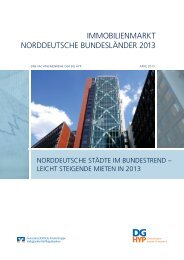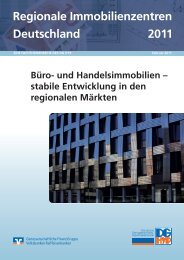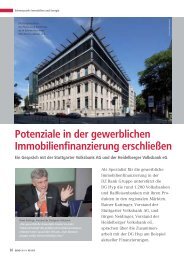Real Estate Market Germany 2009 - Deutsche Genossenschafts ...
Real Estate Market Germany 2009 - Deutsche Genossenschafts ...
Real Estate Market Germany 2009 - Deutsche Genossenschafts ...
Create successful ePaper yourself
Turn your PDF publications into a flip-book with our unique Google optimized e-Paper software.
DG HYP REAL ESTATE MARKET GERMANY SEPTEMBER <strong>2009</strong><br />
<strong>Real</strong> estate market <strong>Germany</strong><br />
Following the severe economic downturn at the beginning of this year, in recent weeks there<br />
have been increasing signs of stabilisation. The economy was already growing slightly by<br />
0.3 per cent in the second quarter, although this was partly attributable to a number of<br />
extraordinary factors: firstly, the scrappage premium boosted private consumption, and<br />
secondly some construction projects were only completed in the second quarter because of<br />
the cold winter half-year. As a result of the rise in a number of leading indicators, the<br />
chances of levels flattening out in the second half have clearly improved. Nevertheless, we<br />
expect GDP to decline by 5.1 per cent in <strong>2009</strong>. With only a slight acceleration in economic<br />
growth, we anticipate economic growth of 1.2 per cent next year. Investment will then<br />
benefit from fiscal policy measures and exports will increase slightly.<br />
Economic forecast <strong>Germany</strong><br />
as % compared to previous year 2007 2008 <strong>2009</strong> 2010<br />
GDP 2.5 1.3 -5.1 1.2<br />
Private consumption -0.4 0.4 1.0 0.7<br />
Public consumption 2.2 2.2 2.7 2.2<br />
Investments 4.3 2.9 -9.1 1.8<br />
Exports 7.5 2.8 -16.1 5.4<br />
Imports 5.0 4.3 -8.9 5.5<br />
Inflation rate (HICP) 2.3 2.8 0.3 1.1<br />
Unemployment rate (ILO) 8.4 7.3 7.9 9.7<br />
Budget balance as % of GDP -0.2 0.0 -3.8 -5.2<br />
As a result of the sharp hike in energy prices, the inflation rate of 2.8 per cent in 2008 was<br />
higher than at any time in the European Monetary Union’s existence. As a consequence of<br />
the sharp decline in the oil price, a barrel of Brent oil was only half as expensive in July this<br />
year as in the same month last year, and the inflation rate has therefore slipped into the<br />
negative sector as a result of a strong basis effect: on average, inflation should reach only<br />
around 0.1 per cent in <strong>Germany</strong> in <strong>2009</strong>. As a result of the severe economic downturn, the<br />
number of people unemployed (ILO) in <strong>Germany</strong> has increased by 300,000 since the end of<br />
last year. Unemployment has consequently increased from 7.1 to 7.7 per cent, and we<br />
expect an average figure of 9.7 per cent next year.<br />
Office<br />
Office rents in <strong>Germany</strong> have scarcely risen in the period from 1998 to 2008, increasing<br />
only weakly by an average of 0.2 per cent p.a. Compared to office markets in the<br />
neighbouring countries of France and the UK, the German market is therefore showing only<br />
a very moderate performance, since office rents in these countries have increased by an<br />
average of 2.2 and 2.7 per cent in the corresponding period (see graph below). Rents in<br />
France and the UK surged in the years 2000 and 2006 and 2007, with rates of increase up<br />
by 15 and 35 per cent on the previous year at times. German office rents showed their<br />
strongest growth of 5 per cent in 2000. However, <strong>Germany</strong> was also affected by the<br />
Europe-wide downturn in the markets in the years 2000 to 2004 with a decline of around 16<br />
per cent.<br />
The situation is different with regard to vacancy rates, with <strong>Germany</strong> at the upper end of the<br />
range compared to France and the UK at around 8 per cent (see graph). This is attributable<br />
to the comparatively high level of vacancy in German office centres, while rates in Paris and<br />
London are well below the country-wide average.<br />
German economy likely to contract<br />
by 5.1 per cent in <strong>2009</strong><br />
Only weak economic growth next<br />
year<br />
Unemployment could rise further<br />
Office rents have hardly risen in<br />
<strong>Germany</strong> since 1998<br />
Situation in France and the UK quite<br />
different<br />
However comparatively high<br />
vacancy area in <strong>Germany</strong><br />
2














